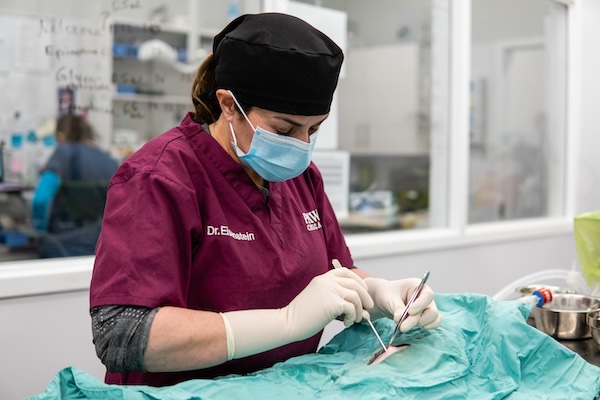Scaling Up Spay/Neuter Programs to End Pet Overpopulation
Jan 16, 2025
To build a No Kill Chicago, expanding free and low-cost spay/neuter services is the most essential pillar.

To combat the pet overpopulation crisis looming over 2024, the PAWS Chicago Nan & Wayne Kocourek Medical Center in Little Village underwent significant operational changes to boost its steadfast commitment to No Kill through spay/neuter.
“We know the best way to prevent needless euthanasia is to focus on one powerful solution: targeted spay/neuter for pets in underserved communities that are most likely to breed. This year, we undertook a major effort to optimize our capacity to perform spay/neuter surgeries, the most effective tool we have to prevent overpopulation at its source,” says PAWS Chicago Executive Director, Alexis Fasseas.
A Year of Transformation
Throughout the year, the Medical Center was buzzing with a sense of urgency and purpose as we rolled out new initiatives to provide critical services to more pets in need. From adding key staff members to implementing cutting-edge medical practices, our goal was clear: maximize our surgical capacity while ensuring the highest level of care for every animal that walked through our doors.
In January, Dr. Alycia Eisenstein, expanded her role from high-volume surgeon to Chief Medical Officer. As one of the leading spay/neuter surgeons in the nation, Dr. Eisenstein’s surgical skills as well as her clinical and business expertise were essential to lead the Lurie Clinic’s operational expansion.
We also knew optimizing our existing resources was just as important. McKinsey & Company, a leading global management consulting firm, volunteered an entire engagement team to assess potential enhancements of key processes at the spay/neuter and vaccine clinics. The partnership involved observing and analyzing current workflows, identifying inefficiencies, and recommending improvements aligned with strategic objectives.
With the support of their insights, PAWS implemented several transformative changes, including refining pricing for low-cost spay/neuter services, introducing digitized appointment booking, and implementing a deposit system to reduce no-shows. These initiatives have enabled PAWS to streamline clinic operations and improve overall efficiency, reflecting the direct impact of McKinsey's analysis.
Training to Increase Expertise and Efficiency
We kicked off the year with Dr. Eisenstein and Dr. Karen Kerr spearheading a series of training initiatives aimed at elevating the skills of our entire medical team. These monthly training days, held on the last Wednesday of each month, were a combination of didactic lectures and hands-on practical work. The trainings focused on cutting-edge techniques in anesthesia, patient monitoring, and surgical efficiency—critical components of performing safe and effective high-volume surgeries. The goal: to both increase volume and improve efficiencies.

By the middle of the year, our staff had gained new insights and refined their skills, allowing us to increase the pace and volume of surgeries. In 2024, we surpassed 17,000 spay/neuter surgeries for the first time since the pandemic. We had laid a strong foundation for growth, and then the results started to unfold.
Strengthening Medical Operations to Drive Lifesaving Growth
In October, Brian Shears joined PAWS as Head of Medical Operations, bringing a robust background in managing large veterinary hospitals and launching startup specialty hospitals to scale. Brian’s medical operations expertise is exactly what the Medical Center has needed to reach the next level of lifesaving—both for our spay/neuter and shelter medicine teams.

We were able to perform 17,168 surgeries by the end of 2024—an increase from 16,587 the previous year. Looking ahead, our goal is to continue expanding our reach and efficiency, with an aggressive goal of performing 20,000 surgeries in 2025.
The Road Ahead: A No Kill Chicago
With our work at PAWS Chicago, behind every number is a life. Each surgery means a future without litters, a future where fewer pets end up homeless and euthanized. Every surgery is a step towards a No Kill Chicago, where every pet not only survives but thrives.
